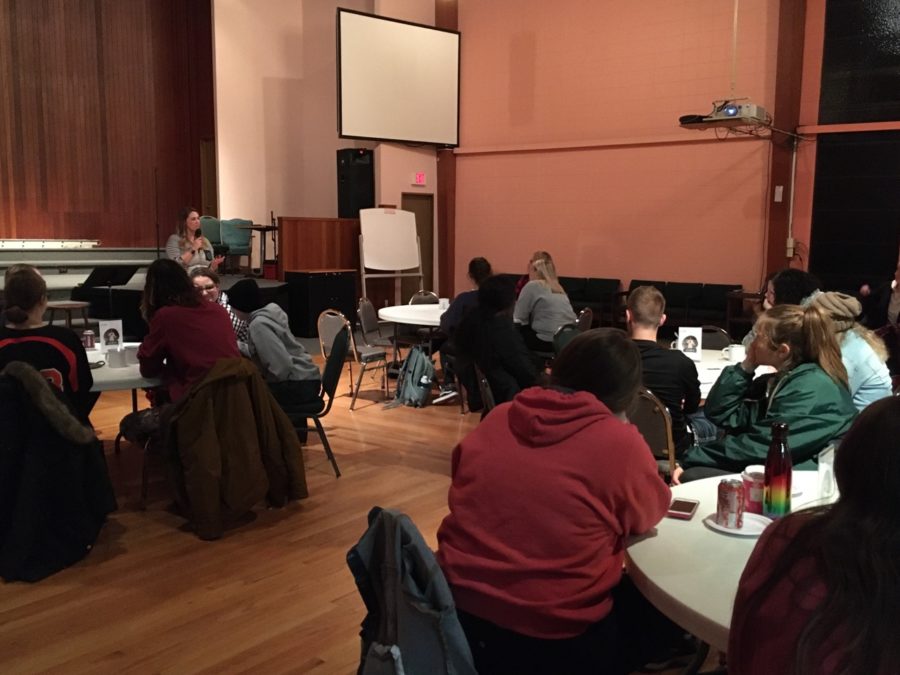Event explores how feminism and religion relate
Morrgan Zmolek/ Iowa State Daily
Jennifer Hibben, campus pastor and reverend for the Collegiate United Methodist Church, led a discussion around the idea that Jesus is a feminist Wednesday.
November 6, 2019
More often than not, feminism and religion are two words people don’t associate together.
On Wednesday, the Collegiate United Methodist Church hosted an event titled “Jesus is a Feminist,” which discussed that characteristic of Jesus often not talked about in religious communities.
This event comes in a series of monthly events spanning the fall semester that aim to facilitate discussion based around Jesus’ character traits to allow students to think critically about who Jesus was.
The event began with a prayer led by a student, followed by some words from campus pastor Jennifer Hibben. Hibben started out her talk with the definition of feminism that would be used in context to the later discussions and give the students something to build upon in those discussions.
That definition of feminism is as follows: The advocacy of women’s rights on the basis of the equality of the sexes.
From this point, Hibben posed a question.
“When you hear the word feminism, what’s the first thing that pops into your head?”
Students all around shouted out words like “equality,” “advocacy” and “women.”
Hibben then asked the group who had thought of “Jesus” as their word. She said she would not have thought of Jesus in response to that question either, and that most people would not, before discussing the importance of why a topic like this should matter to people.
So, why does it matter?
It matters, Hibben said, because there are women in religious communities, even ones in Ames, that still do not have full inclusion within those communities. Women, in some circles, are still not allowed to become pastors and still taught that they are less than.
Hibben then encouraged everyone to consider a few things while thinking about the concept of feminism in religion and spirituality. Firstly, the separation of Jesus from the whole of the Bible to talk about him as a person and the ideals that he had. Secondly, the separation of Jesus from the church, as some churches continue to use the teachings of Jesus as a means to suppress women.
Each student was challenged to think about some general questions presented about feminism and its role within the church and discuss them in their respective small table groups scattered around the room.
In addition to those questions, the groups were given a few different scriptures from the Bible to provide examples of a few interactions between Jesus and women. From there, they were to discuss how they could see from those scriptures the idea that Jesus is a feminist.
One such scripture was John 8, the second verse. It is a story about a woman who committed adultery and was dragged to a temple where Jesus was for persecution as a result of her sin. The punishment for her crime was stoning, and the Pharisees presented her before Jesus to test him by asking him what he thought of the law. Jesus replied that whoever among the Pharisees had no sin should throw the first stone. He did not condemn her, though she was a sinner, but instead showed her compassion and encouraged her not to sin.
From this scripture came discussion about the hypocrisy of the law under which the woman was to be stoned for. Even though another man had actively sinned with her, he was not held to the same punishment. The idea of some religious ideas and scriptures perhaps being taken out of context or misinterpreted was also brought up. For example, John 8:2. Many students commented on the fact that they had heard people teach that specific story before, but never had they heard it within the context of feminism.
Daniel Hayes, junior in political science, said, “I think that [this event] made me better aware of how I could try to advocate that Jesus was a feminist to other Christians who may not be aware or who are stubborn to believe it.”
This event was ultimately about facilitating conversation and allowing students to learn from each other as a result of their different thoughts or perspectives around certain questions or aspects of Jesus in relation to feminism.
“I’ve always held the belief that Jesus loves every single person regardless of their identity or background,” said Jensen Wilke, a sophomore in speech communication. “Being able to have a place to talk about it and have those conversations that are extremely important to have and to bounce off each other and figure out ways we can create an inclusive community that supports the idea that Jesus is a feminist is such an important message to share.”

















